SoftHearted
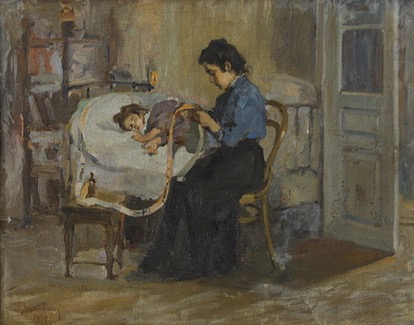
Hmayak Artsatpanyan, Sick Child (1900)
"I'm still pondering the present he left behind."
I think of myself as a Soft-Hearted SOB. This characteristic usually manifests as a tenacious unoffendableness, which means that I don't often say if you've offended me. I'll widen the gap between us instead. If you've royally pissed me off, you might never hear from me again, but I rarely say anything as I exit. Perhaps my response springs from my begrudging understanding that I'm nobody's reformer. I live and let live without trying too awfully hard to get everything to line up according to my sense of order. I notice but stay mute.
I rarely witness my temper boiling over.
MistMeals
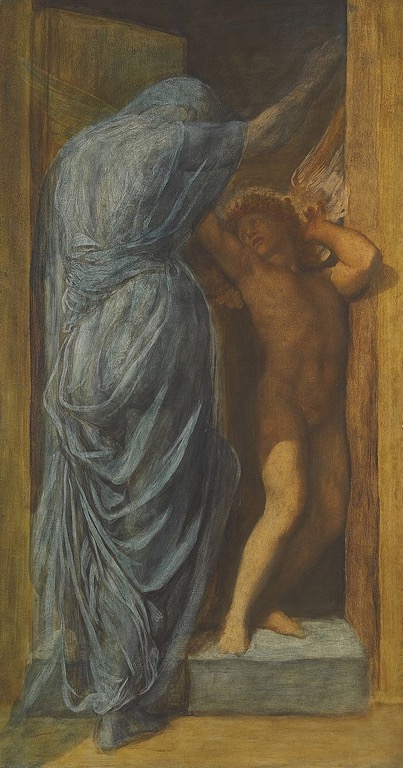
George Frederic Watts: Love and Death (c.1885–7)
"HeadingHomeward seems an extended trance …"
Many activities carry some specific marker which somehow signifies their presence. These markers vary widely and often revolve around a specific food served as a part of some celebration, though many everyday activities carry markers, too. In The South, for instance, a simmering pot of Hoppin' John, a vile concoction served for good luck, screams New Years. Some families invite ham to their Thanksgiving table while others observe the day with turkey, refusing any substitutes. "It just wouldn't seem like Thanksgiving without a bird." A lunchbox packed on the kitchen counter served as one sure marker that my father was heading to work that morning. Bag lunches served as a similar indicator that us kids would be heading for school. Some activities, though, carry no such marker, and I speak of those this morning.
The Muse and I tend to find ourselves so deeply engaged in some classes of activities that we quite literally forget to eat.
Reprospective

Thomas Cole: The Voyage of Life: Manhood (1842)
"I'm not even my own exemplar of how I should be living."
My life moves both too slowly and too quickly for me to in any way accurately experience it. In any moment, I'm very likely too present to perceive deeper meanings. Later, tearing myself away from focusing upon any present moment will likely distract me from perceiving whatever's going on around me then. I inhabit an endless swirl of impressions struggling to impart their significance. I live superficially by default, apparently incapable of fully inhabiting any fleeting moment and also struggling to wrest any deeper meaning in retrospect. I live Reprospectively, repossessing past experiences with my writing, with the expressed purpose that I might thereby more adequately prepare myself for what might be coming next. I seek patterns in my otherwise apparently random experiencing, hopeful that useful, maybe soothing stories might emerge, hopeful that I might have been there in lieu of ever actually being anywhere in any moment. I do not fancy that my experience differs very much from anyone else's. My meanings only ever emerge well after any fact and my facts remain at best questionable. My life might have been completely fictional. I cannot tell.
I employ my Friday mornings to focus myself upon attempting to make sense of each receding week's writing.
JabberWonky
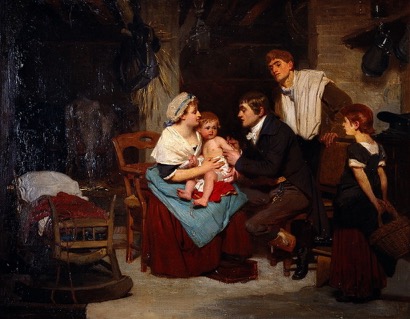
E.-E. Hillemacher: Edward Jenner vaccinating a boy. (1884)
" … what an overlong and terribly strange trip it had been."
Certain lines—queues, really—induce a deep sense of belonging, of being a member in good standing of a clearly upstanding society. For me, my first memory of standing in such a line came circa nineteen fifty-something when my whole birth family queued up to receive the Salk vaccine against polio. The whole Pioneer Junior High School Gymnasium crawled with organized humanity. We must have looked like refugees or something, fleeing from some catastrophe, and maybe we were precisely that. Everyone knew someone touched by polio and all were eager to see that they weren't victim to that tragedy, so everyone, even five or six-year old me, enthusiastically lined up and swallowed the proffered over-sweet Kool-aid shot. We had been background afraid forever and this sugar water offered hope for genuine salvation. Further, I felt even then that I was committing an authentically patriotic act, not just for my country or some ethereal God, but for humanity. I for the first time felt a sense of what I'd later learn to call solidarity in my chest, very near my heart, a first-class member of my community at last!
I've had similar twinges since when enqueued for voting or when openly protesting against some injustice our government had been committing, but that was my first taste of that kind of freedom, the liberty only felt when freely volunteering to become one of many like minds coming together to accomplish something stunning.
ResidentAlien

Paul Klee: Cold City (1921)
"I only ever knew for sure that I didn't seem to really belong there."
Having spent the bulk of my life living as a ResidentAlien, the prospect of HeadingHomeward unsettles me. You see, as a ResidentAlien, I enjoyed certain freedoms open to nobody native born, though most of these freedoms amounted to Get Out Of Jail Free passes exempting their holder from feeling obligated to engage in what I might call civic life. Because the ResidentAlien holds no history to their adopted home, many local interests hold little attraction. Routine celebrations—fairs, parades, various galas— seem tightly focused upon parochial perspectives. Those holding Just Visiting status couldn't care less about the local founding fathers. Here in Golden, Colorado, for instance, Buffalo Bill Cody's memory remains revered in spite of his checkered career as a mass murderer of buffalo and a film flam man extraordinaire. The Muse and I have managed to miss the city's annual celebration in his honor, though we did out of curiosity once visit his grave which overlooks the region from atop the first tier of foothills. We were not moved by the experience.
Over the past twelve years, The Muse and I have been inhabiting more than living, for we've stayed in places where we almost never ran into anyone we knew when we went to the grocery story.
Plausabling
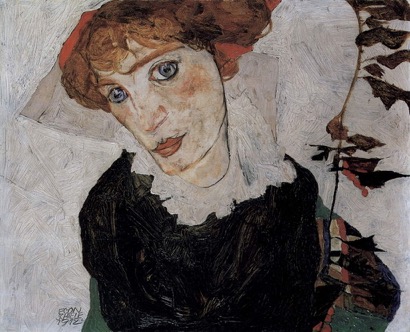
Egon Schiele: Portrait of Wally (1912)
"Opportunity rarely knocks. It generally slips in unseen …"
Managing—even participating—in any project seems like a process continually wrestling with plausibility, but these efforts at best qualify as processes in name only, only distantly authentic. Certainly, one produces plans and lists of activities, but neither of these end up executing precisely as projected. Stuff happens and participants adapt. They then engage in a sort of self-deception to prevent an overwhelming sense of chaos from overtaking. Many of these self-deceptions amount to post-hoc explanations of how whatever happened improved the presumed process. Others describe how fate or something had apparently taken the effort under its wing to provide unrequested guidance and often even far greater wisdom than the original plans had provided. Most of this explaining occurs preconsciously, the conclusions seeming obvious to anyone watching. The auditors typically expect somewhat more detailed justification for swaying away from original projections, and their insistences encourage the production of some of the greatest fictions ever produced about anything.
Projects, you see, remain in a continual state of Plausabling, taking advantage of a curious human capability to ever more fully justify almost anything.
Lye-ing
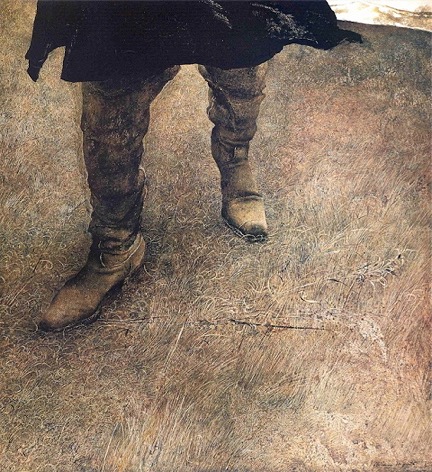
Andrew Wyeth, Trodden Weed (1951)
Oh, what a tangled web we weave,/ When first we practise to deceive! - Sir Walter Scott: Marmion, Canto 6, stanza 17
"Am I dreaming?"
I no more speak in absolute truths than I speak in iambic pentameter. I ain't no Shakespeare but I retain a voice and I use it. I work hard to avoid abusing my voice. I attempt to approximate truths I cannot absolutely prove while avoiding passing on misrepresentations, even when these acts might threaten my position, whatever that is. I ain't no politician, either. I studied advertising in school, and that exposure convinced me against choosing a career in the since-burgeoning propaganda industry. I still struggle to promote myself, firmly believing that my good intentions might chase out others' bad. I'm consequently a lousy competitor. I'm not anybody's 'better than sliced bread' innovator. Commercial bluster attempts to balance information and persuasion to convince skeptical buyers to let down their guard for a minute, but once the meme enters, there's never any effective means for undoing it. I might seem naive, but I, most days, manage to bear living with myself. Some substances effectively replace the benign with the poisonous such that one grows to lose their ability to live without their poison, and lying works precisely like this. Once a false premise gains dominance, it costs Hell's own expense to escape. Some barking damages far worse than most bites.
The society we inhabit has swallowed plenty of rubber worms, often without obvious remorse.
Unexceptionalism

Caravaggio: Saint Jerome Writing (1608)
" … seek not dominion but authentic communion."
The most exceptional aspect of being human seems to be just how Unexceptional each individual seems. Many of us seem convinced that we're somehow exempt from the messier elements of The Human Condition while none of us ever actually prove to be. We each seem prey to curious vanities but also victim to puzzling inanities. We might think we're special and also feel easily wounded by even casual, uninformed criticism. The best and brightest among us seem especially cursed while the average guy, as if such a creature exists, avoids much controversy and seems to cruise through life. The price of notoriety seems to be a focused infamy as every vanity seems destined to be brought to light and eventually vilified. Most saints were martyred. Many innocents get slaughtered. The great face precisely the same fate as everyone else. Posthumous statuary settles nothing.
I wonder whether I'm good enough and no proof ever seems adequate to decide my question.
Okaying

Portrait of Saint Peter Claver in the museum Palace of Inquisition, Cartagena, Colombia
"What else could there possibly be to say?"
It's common practice in this culture, following the death of another's close family member, to ask a fundamentally unanswerable question as both an acknowledgement of another's loss and to serve as comforting solace. "How ya doin'?" seems the most common fundamentally unanswerable question offered at these times. The bereaved, then, either through prior practice or by common example almost always responds with the universally acceptable answer, by which I mean they offer a meek, "Okay." Of course, the bereaved does not usually feel anything in any way like Okay, but the response serves greater purpose than an accurate status update, for Okay works as few responses ever could. Delivered under this condition, it induces a trance which allows the receiver to translate it into whatever meaning they'd hoped their inquiry might elicit, thereby satisfying both the bereaved as well as the inquisitor. This exchange works like magic every time and proves much more reliable than any so-called more accurate response.
The asker didn't really want to know how the griever felt.
Vacating
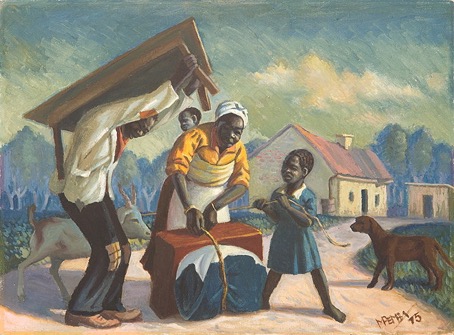
Trek: George Pemba (1975)
" … the grace to forgive ourselves for what we knew not what we did."
HeadingHomeward, unsurprisingly, turns out to be a process, and a prolonged one comprised of semi-sequential stages: Aspiring, Planning, Refurbishing, Packing, and today's focus, Vacating. Vacating features both a long nose and an even longer tail. It begins way back in the Aspiring stage when we struggle to envision the place without our presence, an utter impossibility we innocently assumed responsibility for achieving. Of course we failed to satisfy that expectation, it requiring us to see into negative space, but we seemingly had to exert some effort toward accomplishing it, if only for form's sake. I aspire to achieve a clean exit even though I suspects that nobody ever actually achieves this. Still, stewardship insists that we at least attempt to make peace with our eventual absence. Yes, we conclude, this place might just be able to exist without our presence, though we can never quite imagine how. Each stage of HeadingHomeward seems destined to further humble us into acceptance.
I suspect, based upon prior experience, that Vacating here will turn out to be a prolonged affair, probably an eternal one.
RoughingIt

Thomas Cole: Romantic Landscape with Ruined Tower (1832–36)
" … what we call suffering, they would have experienced as pure luxury."
My Five Times Great Grandfather and his new bride headed West in an oxcart for what was then the Iowa Territory from what is now Southeast Ohio, circa 1810. He lost his bride when she fell off a ferry crossing an ice-choked Mississippi River. He arrived alone in his adopted home. I can't compare our situations. We've just lost use of the kitchen for a few days, but I admit to deeply feeling the inconvenience. I just finished clearing a path through about a foot of powdery snow to access the grill, where I set a pot of water on to boil for The Muse's morning coffee. Last night, I heated a pot of beans on that grill while swirling snow speckled my hair. I figure it's an adventure not requiring us to venture from home, though the box-cluttered interior seems almost entirely unlike home right now. We might have unconsciously set about undermining our sense of place when we conspired to change locations, the repainting just a part of a wiser puzzle. More indignities lie ahead, I'm sure, just as sure that I'll faunch at experiencing each and every one of them. I miss my space.
My boots seem too large for my feet, for I keep catching them on errant clutter whenever I attempt to navigate this newly-constricted space.
DistRaction

Pablo Picasso: Weeping Woman (1937)
"I most fear any sense that I might prove myself the master of this experience rather than its unwilling apprentice"
Say what you will about focus, but I come today to sing the praises of DistRaction as one of the more under appreciated treatments for serious distress. They might insist that one must eventually face trauma head on and fully integrate its lessons, but reckoning need not occur immediately or necessarily permanently. It's not chicken shit to sit a spell with an upset, nor does it necessarily qualify as dysfunctional to defer dealing with it until some seemingly more convenient time. Some integrations seem to need some aging before they can be savored. Others come without handles and simply cannot be grasped at first. Under these and many other conditions, a decent DistRaction becomes a godsend. The form of DistRaction probably doesn't matter, at least not at first. A binge-watch equals a good book, a previously-scheduled commitment serves just as well as sudden snow squall, anything at all capable of drawing away full attention for a while might work.
The Muse and I and her visiting sister Donna are living out of boxes this week.
WhiteElephants
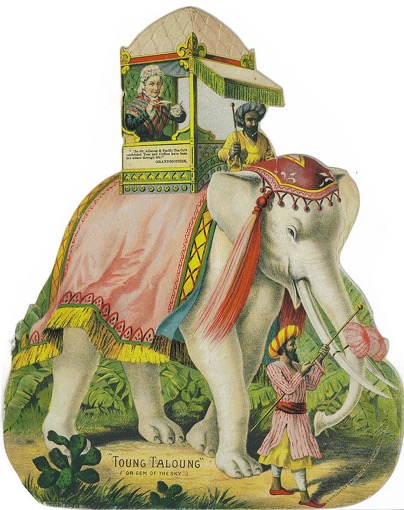
The Great Atlantic and Pacific Tea Company advertisement, featuring P. T. Barnum's WhiteElephant Toung Taloung. (Circa 1885)
" … probable salvation to certain damnation in an instant of sober consideration."
While packing up the contents of her two towering china cabinets, The Muse was not surprised to find a few WhiteElephants hiding within them. Each WhiteElephant was once considered a unique and somewhat sacred beast but had somehow lost its context over the time since acquisition, to become a glaringly unique item in an increasingly homogenous collection. Each no longer seemed to belong. What she might have originally acquired as a unique, one-of-a-kind item, she would dispose of for essentially the same reason. The thrill attending original discovery dispersed over the intervening centuries to produce a genuine oddity no longer belonging within our zoo. How each came to this ignoble end seems unimportant, but as we pack up for HeadingHomeward, we're throwing off a surprising volume of once semi-sacred stuff.
I returned from my yesterday morning's run to the Goodwill Donation Center to report a casualty.
AbSensation
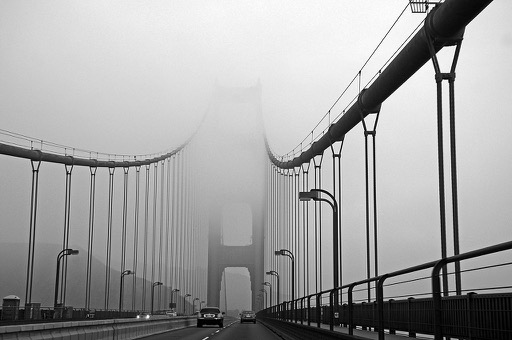
Unattributed: Fog On The Golden Gate Bridge (Free public download image)
"AbSensations might be the means by which one adjusts to absences."
Which of the five primary senses seems most powerful to you? Sight? Hearing? Taste? Smell? Touch? Many of us feel attracted to one over the others. I know myself to prefer auditory input, though I cannot stand to attend loud concerts which seem to abuse the privilege sound imparts. The Muse seems much more visually sensitive than I. She's likely to see stuff I pass by without noticing. I used to, when teaching workshops, sit in the back of the room with my eyes closed so that I could better 'see' what was happening during exercises. I mostly see with my ears, it seems. The Muse can taste flavors I cannot register. Senses serve as definite discriminators, better determining differences than almost any other measurement. For my money, though, I've concluded that the AbSensation proves the most dependably powerful.
The AbSensation, that sensation allowing us to sense an absence, seems most present, though it seems as though it exclusively trades in stuff none of the five primary senses can touch.
DisAssemblage
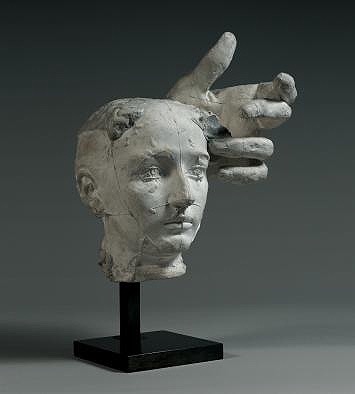
Auguste Rodin: ASSEMBLAGE: MASK OF CAMILLE CLAUDEL AND LEFT HAND OF PIERRE DE WISSANT (Circa 1895)
"I will first view her art in the moment of its destruction …"
The Muse spent the day wrapping and packing 'her' dishes, emptying the two towering china cabinets, disassembling, engaging in an art form perhaps properly called DisAssemblage. Much dissembling accompanied her work, for it demanded that she at least act grown up and dedicate herself to creating an inevitably short-lived result. A few short weeks from now, she'll be disassembling her DisAssemblage to repopulate her two towering china cabinets, flattening sheets of packing paper to be passed on for someone else's DisAssemblage effort. Still, she dedicated herself to proper technique, trusting no one else's eye to protect her treasures, each piece lovingly placed within sealed boxes, an unseen result nonetheless steadfastly produced. We will pray for careful movers and safe storage for these treasured pieces of unseen artwork.
There are unwritten rules for creating such fleetingly-seen artworks.
Inalienable
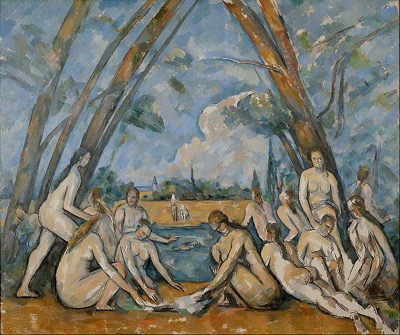
Paul Cézanne: The Large Bathers (1898–1905)
"I … prefer to avoid the sure and certain knowledge that I was the one who lost it."
I don't much care about my formal so-called Inalienable rights. The right to bear arms seems about as useful as a right to wear mismatched socks, nothing that won't disclose more than anyone really wants to know about me should I exercise it. The freedom of religion seems less useful than might a freedom from religion, evangelism being one of the more prominent banes of civil society. Nobody needs to save me. The Inalienable rights I care about seem more fundamental than political, more personal than social. I mostly enjoy the Inalienable right to move around my home without having to think very much about what I'm doing. I revere the ready-to-hand, the quirky semi-secret storage spot where I keep my rubber band supply and the place where the toothpicks hide. My world features thousands of such secure stocks to which only I hold the map. Packing disrupts every one of these.
It might seem a simple matter to clean out a closet.
JourneyManning
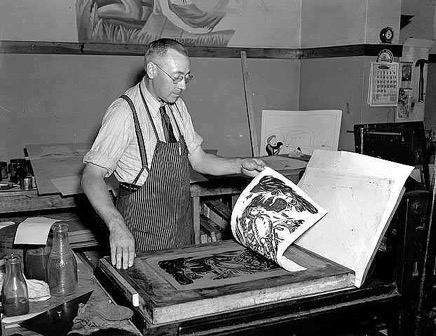
WPA Federal Art Project, 1935–1943: Lithographer at Work (1938)
"Dreams come true not by merely dreaming but by finally waking up."
Begin by going out of your mind. Leave all sense-making behind. Imagine a point in space and time, then focus attention there until the present and all the distance between now and then including the here and now seems to disappear. NowHere becomes nowhere. ThereThen becomes The New Beginning, and everything before, preamble. Arriving there becomes The Purpose; the journey, mere annoyance. 'Are we there yet?' becomes the mantra for existence, one you might just as well be absent from since you're living for a future divorced from this past, your present. Clearly not yet having mastered living, you're still striving beyond your reach instead. What poisonous thoughts have invaded your head that you imagine you might master anything in absentia? Mastering anything seems to demand mostly JourneyManning, which, with luck, might result in producing just an instant of apparent mastery near the end. It was not the master of any future who crafted those results, but the tedious JourneyManning all along the way. Later, after the world no longer holds any need for a more alluring future, then a master might emerge for recognition and appreciation. Until then, it's all local navigation, grunt work, and aggravation. One must master feeling put-upon first. Rest and laurels might follow later.
I used to teach a course I titled Mastering Projects Workshop. I should have called it JourneyManning Projects Workshop
Displacement

A 16th century woodcut of Archimedes' eureka moment.
"I hope we'll find some of our selves imbedded within whatever emerges next."
When I say I'm HeadingHomeward, I put myself in danger of misrepresenting my movement, as if I was passing through passively empty space when I might more properly speak of Displacement. We exit having visited disruption upon our accustomed routines and threatening worse on the other end, for this world, our world, remains tightly connected and any change anywhere transmits shockwaves and worse throughout the system. There are no innocent or isolated actions except through willful inattention, and even that wears thin and insubstantial. A realtor innocently suggested that we update the interior color of The Villa before we leave, which set up a grand Displacement well before we'd actually be Heading anywhere else. Rooms emptied of evidence of our long occupation have been hollowing out what remains of our existence, rendering some days unbearable, or nearly. Privacy has become a premium commodity with the second floor swarming with painters, their tools, and supplies. We're masked to pass through our own house and we sleep surrounded by tarps and paint smells.
Molly and Maximum, our trusty cats, maintain the rhythm of this place, or try to.
Wounding

Thomas Cole: Prometheus Bound (1847)
"Be fierce in your acceptance to learn intended lessons."
Wounds seem delicate but also intelligent. They mostly heal themselves for if they cannot, they might well prove fatal. They usually need acknowledgement more than they need treatment, lest they inadvertently be left to fester. They often need isolation, a quarantine, if only a bandage, and a bandage infrequently checked. Constant scrutiny becomes the enemy of recovery. Time cannot heal all wounds, but the ones that do heal always require patience, often more than the aptly-named patient feels capable of providing. Some distraction helps, anything capable of directing the worrying mind away from attending, because wounds need little attention. Nattering over them never encourages healing, though most do not benefit from neglect. They might demand respect, acceptance that you're ailing without insisting upon becoming permanently disabled. They heal or they don't, but the world will not snap back to the way it was beforehand. Better to project a progression than fall into abject depression about the change. Shit happens and then we heal. Well is a relative state.
Wounds seem wiser than any patient suspects, and even doctors and nurses learn to respect their inherent wisdom.
Schlep

Titian: Sisyphus (Circa 1547-48)
"In Greek mythology Sisyphus or Sisyphos was the king of Ephyra. He was punished for his self-aggrandizing craftiness and deceitfulness by being forced to roll an immense boulder up a hill only for it to roll down every time it neared the top, repeating this action for eternity." Wikipedia
"I slept like a little angel."
I suspect that along about the third century of his indenture, Sisyphus started growing accustomed to his fate, identifying not as the king he had once been, but as the Schlep he had become. While psychologists caution against over-identifying with our professions, few speak of the benefits emanating from this imprinting. Never a conflict between identity and activity, I imagine that one might finally come to feel authentically at one, without contradictions haunting. Those who feel as though they work beneath their station might grow grudgy, and those who have risen above their talents might feel the imposter, but no such conflicts hound the ones who do just what they know themselves to be, and it might be the very font of wisdom to come to accept that what I do accurately reflects just who I am. In this light, no work ever becomes beneath me and nothing I do should qualify as a stretch. I'm not faking it but making it with my own two hands.
Some have wondered how I managed to come by the surname Schmaltz, suspecting, I suspect, that I might have just made it up, it perhaps being a little embarrassing to carry, for literally translated, it means rendered fat.
Unmooring
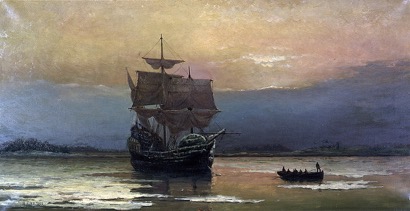
William Halsall: Mayflower in Plymouth Harbor (1882)
"Each sanity first extracts an Unmooring."
There are no discrete events. HeadingHomeward upsets ten thousand tenuous balances regardless of the plan's coherency. During more normal times, most everything naturally maintains its place relative to almost everything else. Things, once finding place, naturally resist displacement, even intended improvement. Tearing apart that first piece unleashes a particularly unpredictable form of chaos, the kind destined to make fools out of especially the most diligent planners. Unmooring begins and seems unlikely to end, even into the suddenly unforeseeable future. We will be many months disassembled and probably many years reassembling Humpty Dumpty again, if ever.
All change begins in utter innocence, the most benign kind of ignorance, fueled by reassurances of experience, for we insist that we've done something very much like this several times before. We haven't.
Hollowdays

Pablo Picasso: Nu à la serviette (1907)
" … even my heart takes a rest beat for every working one."
Not all days are created equal. Some seem rich and full, others, quite naturally hollow. My forebears, none of whom included a Southern belle subject to periodic bouts of 'the vapors,' seemed to live fuller days, many of them life-long seven day each week workers never once declaring a mental health day. Rain or shine, as they say, they were up scrabbling, often for bare survival. Whatever emotional life they might have lived was not enjoyed or very sincerely respected, for feelings offered no good excuse. Work trumped everything, or so I imagine. My mom prescribed 'turning that frown upside down' as the sure-fire cure for every ill, well, that and, later in life, a medicine cabinet overflowing prescriptions, each duly supplied by a doctor intent upon keeping her days just as full as inhumanly possible. Reading the record, though, I notice a concerning frequency of what we now recognize as repression-related illnesses in my forebears' later lives. They might have practiced stuffing, but eventually flooded their systems with unacknowledged emotions.
Each generation considers their successors wimpy and spoiled, a curiously personal indictment on their own parenting skills.
CONfiguring
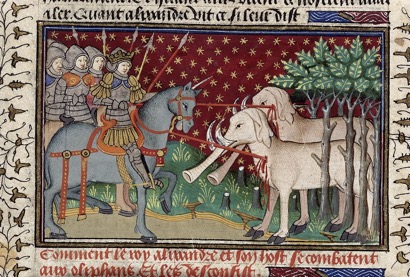
Talbot Master: the 'Talbot Shrewsbury book' -Alexander's knights killing elephants with spears (1444-1445)
"I poke out my work on my reliable old paving stone and showcase my eisenglass."
Modern times were predicated upon the ever-wider spread of and growing uncritical belief in serious misconceptions. We daily see clear evidence of this unsettling truth, as things do not quite seem to ever work precisely as anticipated. We discount some shortcomings as close enough for government work, and many, we seem to grow accustomed to and cease caring about. Streakless window cleaner leaves streaks. Seamless transactions demand contortions. Every point of sale interface operates a little differently such that each demands careful scrutiny from the clerk for whom it was supposed to lighten their workload. The crude little cheat sheet taped to the side reminds the customer that they'll need to slide their card in some utterly non-intuitive way, and few can translate the illustration into successful action, leaving the customer feeling like an idiot and the clerk present as if only to confirm each customer's self-assessment. We're adaptive, though, and remarkably forgiving. In pre-modern times the least of these insults would result in someone getting skewered on another's sword or at the very least, produce a heated exchange of discouraging words. But moderns expect inconvenience as the just reward of advanced civilization.
My new computer, gold-plated and light as eisenglass, underperforms my much older machine, which weighs as much as a paving stone and runs much slower, because I can't quite figure out how to properly configure it. Nobody can.
Grrratitude
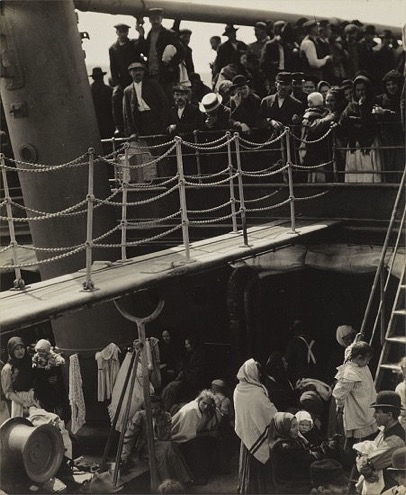
Alfred Stieglitz: The Steerage (1907)
" … wiser than we ever expected to become for the passage."
I feel most gratified and also most mystified by the means by which attitude transforms into gratitude, usually, it seems, by way of rage and resentment. The rage seems well-deserved, and even resentment might initially seem justifiably permanent, for in our tribal past, I suspect that deep grudges might have served some positive evolutionary purpose and not become merely self-destructive, as our much longer lifespans have rendered them. For we firmly believe in endless second chances, recovery, and mulligans, each experience potentially a learning one capable of eventual appreciation. What arrives as a shock might moderate into calmer focus. Since none of us seem capable of fully appreciating any moment, reflection often brings deeper understanding, which might morph into genuine appreciating even for the initially apparently worst of them.
I've been reassured that it does not ever get any worse than what befell us this week, though I didn't experience the worst of the event.
Mouving
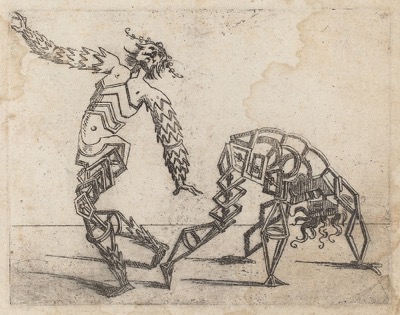
Giovanni Battista Bracelli: Bizzarie di Varie Figure (1624)
" … never more present than just after leaving."
We claim to move in, through, under, and on, but I suspect that we don't, not really, not nearly. Our apparent motion misleads both eye and understanding, for our momentum isn't as smooth and separate as it superficially seems, but sticky. We need nudges. We leave traces—of both our presences and our passings—much more permanent than contrails dissipating upon appearance. I think of myself as Mouving around with the sort of motion requiring a little shoving and a little mourning to get started, some elbowing to proceed, and considerable sloughing off along the way. I leave much behind me and unwittingly (inevitably?) carry much forward. I remain where I was, perhaps forever, and wherever I relocate holds traces from wherever I came. I seem to smear from there to here and onto my next appearance. I imagine myself moving through walls sometimes, and have even succeeded, but only when I accepted the irreparable damage my moving through them inflicted, to both the wall and myself. My lapels tended to be permanently dusted from those antics.
When The Muse and I were still consulting, we'd often encounter those we labeled The Complainants. Many of them had been sentenced by some superior—for "their own good"—to work with us, and most held at least a little grudge at the forced inconvenience.
SayingNothing
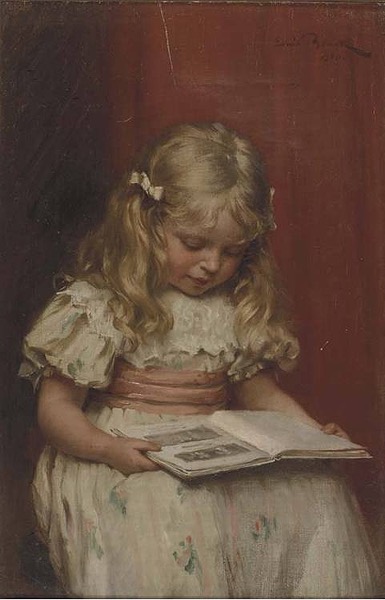
Emil Brack: The Picture Book (1900)
"We must have said everything worth saying … "
They say that there's no fixing stupid, but I believe that smart often proves even less fixable. There's never any real advantage for being the smartest person in the room, for instance, because everyone else will struggle to comprehend what the smarter one's getting on about. Out thinking others earns few appreciations, and that sort of reputation can leave one carrying disadvantaging expectations. Many will sit watchful, waiting for the so-called smart one to embarrass himself with seemingly irrelevant insights. Further, the really smart ones often find that their best contributions come from SayingNothing, from squelching their brilliance lest others find it off-putting. I confess that I don't know any of this from personal experience, since I'm rarely accused of personal brilliance, but I've noticed and I've known some smart people who didn't mind confessing their sins and shortcomings.
I once had a daughter whose story I might submit as prima facie evidence in my case. She died yesterday at the age of thirty eight, untimely, after a lifetime struggling to fit in.
TheSecondCar
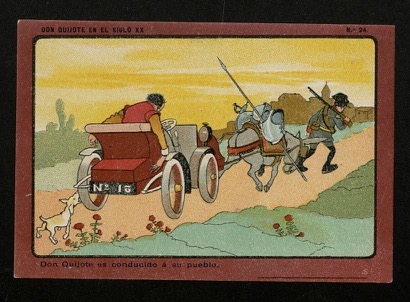
Spanish cartoonist Pedro de Rojas: Don Quixote is driven to his village, from a series of chromolithograph postcards reimagining the adventures of Don Quixote and Sancho Panza for the twentieth century. (Circa 1905)
"That SecondCar might have represented a sort of vanity, standing squarely between here and a finer sort of sanity."
For most of our time together, The Muse and I have been a one car family. The first decade together, we owned two cars between us, a condition that both complicated parking and left one of the two cars idle while we used the other one together. We almost always headed out together. When we left the original Villa Vatta Schmaltz to move to DC, I sold my vehicle to my grand nephew for a quarter because we figured that it would make no sense to straddle ourselves with two cars in a big city. This move proved prescient, for in the six years we lived there, The Muse drove to work exactly twice. She much preferred to hop the much more convenient Metro down to The Mall where she worked. Even that one car mostly sat idle except for my foraging forays and the occasional toodle into surrounding countryside. Cities seem distinctly hostile to cars, which overwhelm them. For a while, we tried going carless, using busses and ZipCars when transportation seemed necessary, but this complicated beer runs—nobody needs anybody transporting half cases of beer on a public bus—so we after a month, bought a bit of a beater to better balance those scales.
Last year, visiting old friends in Tucson, we learned that they were retiring their old Lexus.
Bearding
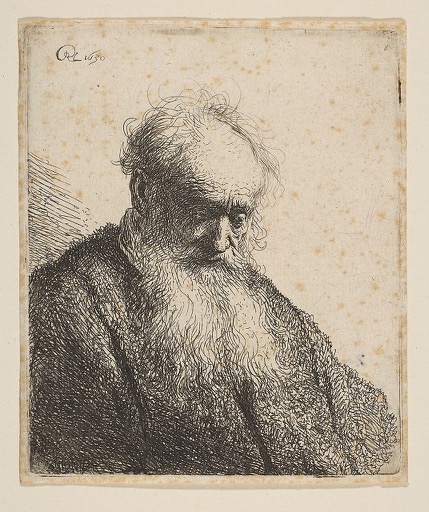
Rembrandt: A Bust of an Old Man with Flowing Beard: the Head Inclined Three-Quarters Right (1630)
"I might even find deeper meaning in my life hiding behind a beard."
I think of myself as being in the meaning business. True, it doesn't pay much, but it's my manner of living. I can't accept face value. I believe that everything holds deeper meaning and that appearances prove misleadingly superficial. We can't tell books by their covers because book covers aren't books, but then neither are their contents. Books might be experiences never found very well represented within any of their components, of which personal reflection perhaps ranks highest. Books seem to be interactions, their meanings emergent, their significance widely varying between individual readers. A single book might hold as many meanings as readers, and perhaps many more than that, for deeper meanings exhibit great ambiguity, shifting as one plumbs deeper. As near as I can tell, meaning continues expanding as long as attention holds.
All of my adult life, I've maintained a cleanly-shaven face, with the exception of my once rebellious and since tamed mustache.


